
|
|||||||||||||||||||||||||||||||||||||||||||||||||||||||||||||||||||||||||||||||||||||||||||||||||||||||||||||
When we talk with people from the entertainment industry they explain how they can't just release stuff on the Internet, because they have agreements with the rights holders that assume the realities of the old more restrictive distribution system. Those are the writers.
I'm a net native (even though I've heard young people question whether anyone my age can be) and while I appreciate the human concerns, there is no meaningful way to be sympathetic. I'm not going on strike, even though I am a writer. I don't ask to be paid for my writing. I haven't been paid for writing software in a very long time, but I keep doing it. Yet I look in my bank account, and somehow the balance keeps going up. In the end, that's all that matters. I don't hold on to a principle that I must be paid for what I do. I look at money as separate from my living. I live through my work. Some of it pays, and it's unfortunately unpredictable what that is. Welcome to the net, welcome to the 21st century. I heard a report on Nightline how the writers of The Simpsons are producing YouTube videos, and they're funny. Of course they are -- the people who write that show couldn't possibly write something that wasn't. They should keep doing them, I suspect they will.
But as Valleywag points out, the war in Iraq still rages, Bush is still President, and MoveOn is still a creepy organization that sends out prodigious amounts of spam, and when you ask them to stop they respond with more spam. Facebook wants to change, but like everything in tech there are tradeoffs. Open up more (good spin) and lose some privacy (bad). They figured no matter what they did people would protest, so they did something extremely radical, people freaked, they backed off, and now will do something less radical, which is probably what they were planning all along. FB is a smart company run by people with IQs higher than typical creeps at political action committees. God knows what they're thinking at MoveOn, but they lost my support with this ridiculous incursion into techland.
There are two sides to RSS, casting and catching. On the casting side, obviously there is: 1. MP3 casting (aka podcasting). 2. News item casting (blogging, news organizations, PR). 3. Photos (not much has been done here, but that will change). 4. Video (check out the major networks, they're doing a lot here). 5. The new hard to describe (for me) casting done by users on social networks like Facebook (which I almost called Feedbook). 6. I think Twitter is a form of casting (it's also a catcher). 7. Publishing bits of code in feeds. I use this extensively as the update mechanism for all my software. Others do too. 8. Torrent feeds (slapping forehead). With this innovation it's possible to write a TiVO that runs on a desktop or Mac Mini. Check out EZTV's feed, very sensible, futuristic (one hopes). 9. What else? Some comments... For MP3s you're basically on your own. There aren't many tools for creating RSS 2.0 files with MP3 enclosures. This art has been around since 2001, it's been popular since 2004, so it's fair to assume perhaps that there isn't much demand. It's pretty easy to cobble together a podcast feed by hand. I write scripts to do it, myself, I never do them by hand. Blogging software is probably the most common tool for news item casting. For photos, you have Flickr, and Apple's iPhoto does something they call "photocasting" but I haven't investigated this yet (I will, for sure). I have some stuff coming here myself not too far down the road. Question: What photo collecting sites offer RSS feeds of users' photos? Are they compatible with Yahoo's feed format (they use a namespace called Media RSS) or do they use enclosures, or something else? Answers: Zoomr, ShoZu (but no metadata about the photos, so what's the point). For video, it's basically like MP3, if there are any tools on the casting side, I'm not aware. If you'd like to add anything to this list, which is far from complete (I'm sure) please use the comments. I'll write about the catching side of this later. I've heard that podcasting didn't achieve its promise, and I guess it's time for me to say what I think about that. First, obviously it depends on what you felt was the promise. Second, it depends whether you think there's more to do. I think there is, and when that's done, podcasting will become more than it is. As much as I love the iPod, it is not a great podcast player. However, unfortunately, it is the best podcast player you can buy, today. What if the energy that went into Chumby, for example, went into designing a podcast player? The player might actually look more like Chumby than it does an iPod. The interesting thing about the Chumby is that it is connected but not tethered to the network. The ideal podcast player would be even more loosely connected.
2. You could use it to create a podcast. We're basically there with Twittergram and BlogTalkRadio. Just call a number, and we not only shoot your minicast at Twitter but we also maintain an RSS 2.0 with enclosures feed. In other words, in every way, it's a podcast. 3. It must be open, so users can have a range of choices of catcher software. I don't think a one-vendor approach has a chance of working. When we get this device, podcasting will work better. In terms of expectations, a lot of people hoped they could make podcasts and quit their day jobs. I wasn't one of those people, and I never encouraged people to believe that. I see podcasting, for bloggers, as just another way to communicate with a few people who are interested in what they know and think. I also see it as a way for professional news organizations, esp non-profits, to flow reports to people in a very convenient and powerful way. As a consumer of podcasts, I am in heaven. I am a regular listener of: Meet the Press, Face the Nation, This Week, Fresh Air, Nightline, NYT Tech Talk, and numerous NPR shows. I have far more content than I have time to listen. Thanks to podcasting I am a much better informed person, and it gives my mind something to do as I get my exercise. I don't do my own podcast very often these days, but then I don't do much public speaking or go to many parties or do press interviews either. I'm in a quiet period. I don't know how long it will last, or if it will ever end, I'm just going with the flow. I like to write, and hang out with friends in small groups, and I do a lot of reading and listening, and I also am working on software projects. If I were driving coast to coast or going to political conventions or teaching at a university, I imagine I would also be doing more podcasts. The Times *finally* gets the Leopard story When Leopard came out Pogue gushed that it had so many features he couldn't hope to write about them all. The real news -- not approved by Apple of course -- to get Leopard to run, many users would have to do things that would make a Windows system administrator blush. This, from the computer that "works the way you do," according to their ads. On the NY Times blog, today, Saul Hansell finally has the story. A reminder that you can subscribe to all the comments here on Scripting News with this feed. http://scripting.com/commentsRss.xml
The receiver is working with the cheap antenna that it ships with. Here's a screen shot from a PBS program about Mexico. Look at how sharp it is. Now I have to figure out how to get the EyeTV software to record shows in the future. Very exciting!! PS: I figured out how to get it to record. But playback seems to be only through their UI. How do I get an AVI file so I can watch it in the den or bedroom? Are they trying to say I have to watch it at my computer? There must be some way to get it to export, or do I have to buy the $39 add-on for that? Enough to make me (almost) love Mitt Romney "Like all Americans we love our sports teams and hate the Yankees." Last line in tonight's Republican debate, delivered by Mitt Romney, former governor of Massachusetts. Joel Spolsky has the Digg-clone I envisioned for Scripting News. A programming lesson I keep relearning. The design of the central data structure of an app determines the quality of the app, in every way. Any extra thought that goes into this, will pay off in: 1. Maintainability of the code. 2. Size of the code (you'll write less code with a well thought-out central data structure). 3. Simplicity of the user interface (the structure inevitably shows through in the UI). 4. Ability to respond to feature requests. 5. Adapt to new hardware, OS changes, other apps. 6. More "it just works" experiences. This is why it's sometimes the right thing to start over from scratch. Programmers often want to start over because they look at the code and it looks complicated, and they think they can make it simpler if they start over. They're right, of course, it will be simpler when they start over, because it won't do nearly as much as the mature product does. Once they finish building out the feature set, it may well be just as complicated. It's a judgement call. I remember looking at the source of Unix kernel for the first time as a grad student in Wisconsin, and being amazed at the simplicity and obviousness of the code. I couldn't believe something so simple actually worked. Your code at its kernel level must have this simplicity. But at the edges, where you're accomdating the minds of users, inevitably it gets a little messy. The key thing to look for is how hard is it to add a completely new feature. It should be easy to do that. If it's not, it's likely because of a poorly organized (and therefore not well-understood) central data structure. I've rewritten apps many times, over many years, because when I wrote the first or second versions, I didn't understand the problem well enough, and the code had turned into a morass of patches and workarounds. Right now I'm recoding the internals of a special-purpose aggregator. I've written many of these, over the years, always quickly, trying to get something running fast, and then lived with data structures that resulted. This time I'm going slowly and carefully, with an installed base of one (me) and ripping up the pavement whenever I find even a slightly better way of doing something. I have other users who are waiting, but that's life. 5/7/97: "When a programmer catches fire it's because he or she groks the system, its underlying truth has been revealed." From the What a Great Idea Dept, this guy has made the Wii remote work with Macs. Thanks to JY for the link.
I'm working with people in Italy to organize a conference in February to create a connection betw American and Italian bloggers. Of course the food will be excellent, as will the wine. The Italians will tell us how poorly their country runs, and we will tell them we wish we had it so bad. London Geek Dinner, December 7, 7:30PM I'll be in London on Dec 7, as will Robert Scoble, so Hugh MacLeod, the blogger who does those outrageously funny business card size cartoons, is kindly hosting a dinner that evening. There's only room for 50 people, and already 40 people have signed up (sorry about that), so if you want to come, please quickly send an email to Hugh. The details are on this page... http://www.gapingvoid.com/Moveable_Type/archives/004358.html Looking forward to visiting London!!
Dave
The next step in the next step
I've been head-down for the last month, writing code, designing, working with a small group of testers, learning, rewriting, etc. My deadline is early December, which is coming up very soon. I want to be able to talk about this work at Le Web 3 in Paris on December 11. Yesterday, I heard for the first time about software called Pligg, it apparently is a Digg clone that runs on LAMP systems. I don't know much more about it, but I'm certainly interested. I have a MAMP test-bed running here, so at some point I will probably try to set up a Pligg installation to play with. Yesterday I got the Slingbox, my second one (the first was given to a friend, I was frustrated at setting it up). This time it worked, and now I have TV on any computer in the house. This is really cool, actually it's so cool I'd say it's a thrill. The setup still required guessing and fear that I was doing it wrong, they used terminology that I was not familiar with, for the type of remote I have. But in the end it worked. The reason it didn't work the first time is that the connections on the back of a modern TV and settop box were foreign to me. Now they're familliar. I also got my HD tuner for the Mac, runs on a USB port. I haven't had time to set it up, but I'm anxious to do so. I'd also like to also thank the guys at Disqus for providing excellent comment software, it runs very nicely in my environment, and has sufficient moderation tools to keep discussions focused and not abusive. The community at Scripting News is becoming visible again, and I'm happy to report that they're still the smartest, most knowledgable, helpful and generous mofos I know. It's making this blog much more fun for me. And you can quote me on that.
This left me with a vexing problem -- which one should I work with, and what should I tell the others? I decided to work with all of them, and anyone else who may be reading, by describing the project here, openly. So here's the idea... Imagine Digg in the old days, when there were just 25 people using it. Maybe that wasn't enough. Maybe it didn't really get interesting until there were 100 users or 250 or 1000. It was good, the articles were gems, things we weren't finding on our own, there were huge numbers of them, but they were prioritized, and the community had a heart of gold, people were doing it for love. The maturity level was high. But then something happened as Digg grew from 100 users to 100,000 and more. I'm not going to characterize it other than to say that it stopped being interesting to me as it grew. The stories weren't what I was looking for. I wonder if we could start a Digg-like community with the readers of Scripting News. The numbers are small, relative to Digg, it would be just like the old days, maybe 250 active participants. I was describing the idea to Fred Wilson this morning, and offered that his blog might host such a community. Or we could do a Digg-like community with 25 people by invitation, some you've heard of, some you haven't. All would be voracious news junkies. They would be empowered to add articles, comment on them, vote them up or down. I would invite Scoble, Fred Wilson, Steve Rubel, Amyloo, Jim Posner, Lawrence Lee and (I'm sure I'll think of many more). We'd count on the judgement of these people to find us interesting news items, and be fair in deciding their relevance. Key point -- it would serve as an editorial system. Only members could participate in the social functions, but anyone could read the results. You could see what the community decided was important at any moment in time. You might choose to read the TechCrunch Digg clone, but not Scobleizer's or Instapundit's. Two very smart people are thinking this way too. 1. Steve Gillmor, the genius who brought us attention and gestures, has exactly this kind of system running right now, in private beta. I first stumbled across it when I described the idea to a friend back in October, and was told "You have to talk with Steve!" So I called him, and sure enough he had it. He plans on unveiling it publicly very soon, perhaps even this week. 2. Om Malik and I talked about this on Saturday when he came to visit in Berkeley. I am pretty sure this is part of the editorial system he'd like to use at GigaOm. One thing we both agreed on, strongly, is that it's time to shake up the market for open editorial tools. It's been stagnating. Enough of that! So that's the idea. I want starting a Digg-like community to be as easy as creating a weblog on blogger.com. Just fill in a form, click Submit and off we go. Let a thousand flowers bloom. Sure most will be ghost towns, there will be press articles talking about the abandoned communities, but I bet we look back in a couple of years and see the landscape in the blogosphere has changed yet again.
If so, I have an idea that starts with a Digg clone, and I may have a business proposition for you if your product is right and you are willing to retool, slightly. Send me a private email if you're interested. Principals only. The Twittergram site makes it easy to flow pictures through your Flickr account to Twitter. Now you can see the stream of pictures, visually, not as URLs. http://www.twittergram.com/picstream It gives you a visual look at the community. Worth a look, maybe a bookmark? It's not currently available as an RSS 2.0 feed with enclosures, an obvious to-do list item. The user experience has been a disaster
"The user experience has been a disaster," says Tony Davis, managing partner of Brightspark, a Toronto venture capital firm that has invested in two mobile Web companies. The NY Times has totally ignored the NY Times River, which makes the Times work on mobile devices with ease of use that they so often report is eluding them. It's like a fly perched on the end of your nose. You can feel it but it won't come into focus. Please, Times people, I beg you -- use it to read the Times while you're riding on the subway or waiting at a red light, in line at D'Agostinos, Katz's, Junior's, Original Ray's, The 2nd Ave Deli, Sammy's or Zabar's. You'll fall in love. I promise. (At least someone will. There must be some news junkies at the Times??) PS: I don't think the Times has a mechanism to cover itself as a technological innovator. As far as I know they never ran a story explaining what RSS is and the role the Times played in making it a standard. It's vexing. It's not as if the Times doesn't report on itself, it does. PPS: Thanks to the Times for the link love from the main Tech page today. Digging into the latest Facebook privacy issue In response to yesterday's piece about gaining control of our data, jmdelaney says that the newest Facebook issue is serious. I don't doubt that it is, I just don't fully understand the issue, and I bet a lot of other people don't either. To restate my point -- there is some kind of disclosure we want them to do, and others we don't. Let's not say all disclosure is bad. I might not mind having a purchase of an electronic gadget be a public act (with conditions) where I would mind disclosure of medications. Clearly this should be up to the individual to decide. Until I understand how it works, I'd like the default to be opt-out, and I decide to opt-in on a case by case basis. What conditions might apply? Well, if they're going to disclose that I bought a Slingbox, there ought to be a way for me to attach to that reference a diary of my experiences with the product. The link shouldn't be without risk to the vendor, it should carry information that's useful to other potential purchasers.
How little we know about what they're doing. Please post links to screen shots. Help us figure it out. As far as I know Facebook hasn't leaked any of my data (or have they?) Scott Rafer has two excellent posts on this topic. Ethan Zuckerman explains, with screen shots. "Pardon me while I switch all my embarrasing purchasing behavior over to another browser that doesn't know anything about my social networking sites." Subscription list interchange may be prior art I have to write a piece about how OPML came to be the defacto standard for interchange of subscription lists. I hadn't thought about it this way until just now but it's actually the model for what I want Netflix and Yahoo to do with movie rating data, and now it's just been suggested that the model be used for interchange of social network data. I know the gurus of this probably won't like it, but it actually a good use case. This could be the beginning of an interesting comment thread.
Every time Facebook moves, they stir up stuff. It happened when they first implemented the innovative news feed feature. All of a sudden you could keep up to date on who's-with-who without visiting their profile page. The users of Facebook had been counting on lack of interest, on obscurity, to keep information they consider private out of view of people, who, because they're "friends" have been granted access to the information. By automating the process, much as RSS readers automated news gathering for blogs and newspapers, the information was no longer obscure. Facebook held their ground, and now the news feed is part of the fabric of their community, and people presumably are a bit more careful about what they post. That's what they should have been doing all along, a safe computing expert would likely say. Now they're breaking down another barrier and of course there's a sense of violation, and I'm not saying that Facebook is right, but before we claim they're wrong, let's understand what's going on. There are thorny issues here, but we want these companies to give up control of our information, and we don't want them to be overly scared of public opinion as they do it. And this is hardly the most important giving up of control. Most important, I want them to give me control of my data. So before we overly politicize the leading edge of technology, let's get together on what actually does and doesn't serve the user's interest. I want Netflix and Yahoo to give me an XML version of my movie ratings, for me to decide what to do with. I've been asking for this for a couple of years, I still don't have it. This is information I created. I want to keep a copy. I want to make sure that Netflix knows about all my Yahoo ratings and vice versa. I'd like to give a copy to Facebook (assuming they agree to not disclose it) and maybe to Amazon, so they can recommend products I might want to purchase (again keeping it to themselves). I want to begin a negotiation with various vendors, where I give them something of value, and they give me back something of value. The leaders of Silicon Valley begrudgingly gave up their view of us as couch potatoes, now they think of us as generators of content they can put ads on (and pay us nothing). We still need to work on that respect thing. When I have an XML file here on my local hard drive that they want they'll make me a better offer. Two companies that are not as shiny as they used to be, Netflix and Yahoo, have the power to take a leadership role in a what will be the next revolution of the Internet, but neither of them are moving. That's something worth fighting for, because once one vendor gives us power over our data, the dominoes will start falling, I bet it'll happen very quickly. Okay it is Black Friday... And I want to help the world economy, so... As an act of patriotism... I purchased one of these babies... For Saturday delivery! Click the pic for the Amazon product page. PS: Thinking about getting one of these, to capture over the air broadcasts. Is that what it does?? This OPML Editor script takes a folder of images, and turns it into an RSS 2.0 feed with enclosures, and optionally uploads the images to S3. It could easily be converted to handle other data types. I'm publishing this so it shows up in Google, making it easy for me to find it later. If you want to use, feel free, no support, every caveat applies. You're probably better of coding this from scratch yourself. I took this pic in Dec 2005 in post-Katrina New Orleans. Another, less impulsive, purchase I also bought three of: Because... 1. They're easy to lose or misplace. 2. They're damned useful. 3. On sale, 3-for-the-price-of-1! Hope you had a great party yesterday! Now comes the aftermath... Cold turkey in the fridge. Turkey soup on the stove. Did you go shopping at 4AM? Yawwwwn. Time for coffee.
First, it's a good idea because it saves space and in print, space is at a premium. But they're leaving money on the table. If they used their own web address they could monitor traffic, see how many clicks each location in the paper generated. Maybe stories on the op-ed page generate more clicks than those on the front page? Maybe stories by Ms. Jones get more clicks than those by Mr. Smith? There's also a chance to reinforce the brand, and drive more traffic to your site as opposed to tinyurl.com. And it's good for the web, because it helps keep us from centralizing too much on one site. Lots of reasons to put up your own url shortener. So someday you might see urls like this in the NYT... http://nyt.us/7h It's going to be a busy day here, so probably not too many posts. If you're in the US, good luck in your travel or prep for the big holiday tomorrow. Tomorrow is also the day when the OPML 2.0 spec is finalized. If you have any further comments, this is the last minute! As they say, speak now or forever be a Otherwise, we'll have a new official format to deploy starting tomorrow. Thanks everybody!!! Party in London on December 7?
Building TwitterGram into a really big thing! I love TwitterGram. It's a really cool tool, I use it when I have an idea to communicate and I'm nowhere near a laptop or desktop. I call the special number, 646-716-6000, speak for up to 30 seconds and the system takes care of the rest. Yesterday I did a gram as I drove across the Bay Bridge and was amazed that I could tap into the wifi signal of a nearby AC Transit bus.
I want to keep TwitterGram competitive, to make a business of it. I need a smart young person with lots of energy to manage the product. We'll need a CEO, if it's going to turn into a company. We need to lobby Twitter to add a key feature, or figure out how to provide the functionality without Twitter. And we could use a programmer and a site designer too, to get started. I'm interested in ideas and looking for people to help me build this tool into a product, and maybe a company.
I'm here in San Francisco hanging out with Loic Le Meur of Seesmic. We just read an announcement on TechCrunch that Mike Arrington has invested in his company. Now seems like a good time to say that I too have invested in this excellent multimedia startup. Good luck to all of us. I also did a brief interview with Loic where he tells who else has invested. You have to watch the video to find out! Photo: Whit is editing Seesmic Daily. Solving the TinyUrl centralization problem
Every web app that produces long urls should provide a built-in url-shortening facility. The user interface would be similar to the one in Google Maps they call "Link To This Page." You click on it, and up pops a box containing an address you can use to point to the page. Screen shot. But look at the size of the url that Google gives you. It should be short. Why not something like: http://goog.us/8uj9oj. In other words, why doesn't Google have a built-in shortnener? When blogging software gives you a permalink, it should be short. It's okay to make the user ask for one, why clog up the system with shortened urls no one uses. Another key point, when they give you a shortened url, it should point back to the software that gave it to you, so the shortened link will be exactly as long-lived as the thing it's pointing to. In other words, the URL shortener wouldn't contribute any extra link rot, to use an old term coined (I believe) by Jakob Nielsen. It's a mistake, in hindsight, for Twitter to give us TinyUrl urls, because the link depends on two companies and two servers. It would be better if it just depended on one, less likely to break. Now that URL length has become an issue for users, it might be even better for designers to view URLs as part of site design. Look at the address for the page for the Wii at Amazon. Wouldn't it be easier to find if the address were: Try clicking on it -- it actually works! Why should a user ever see the longer crappy url? In other words, url-shortening isn't just for Twitter users, it's for everyone. Maybe most people don't look at the urls, but some do, and maybe more would if they made more sense? Update: This reminds me, I have my own url-shortener, as I mentioned earlier, but it's a dynamic app, and that bothers me. I'd much rather put a static file in my web server folder that would be understood by a browser as meaning "redirect to this location." I know there are htaccess files in Apache, and other mechanisms in other servers, but I keep coming back to this. I know that there is a <meta> option to redirect, maybe I should use this for a all-static url shortener. Hmmm. I wanted to do one of these conventions for RSS, but I couldn't sell it to other aggregator devs. I did a test, it's not nearly instantaneous. The source. Kindle's most interesting feature The most interesting thing I've heard so far sbout Kindle is that it is untethered. It does its own synching, it doesn't depend on a computer to do it, eliminating the chief hassle of iPods. Can it subscribe to a podcast feed? Can it play audio? I don't know. Kevin Marks says that Kindle requires DRM. "It makes things do less and cost more, and means they will break suddenly without warning when the service inevitably goes bust." David Rothman is an eBook expert with a blog. I'm subscribed. Apparently he's been following the development of Kindle for a long time. Thanks to Amyloo for the pointer. I don't use a Kindle (see above) and I suspect I never will, I couldn't get myself to spring for the $399, which is relatively cheap for a new device with EVDO built in. There's something about Kindle that creeps me out, like reserving a seat on an airplane in row 13. It feels unlucky. I don't feel that way about Macs. I use them all the time. I'm typing this on a Mac, for example. Until yesterday, the most annoying feature of a Mac was that it automatically launches iPhoto, a program which I loathe, every time I connect my iPhone or digital camera. I seem to remember, vaguely, giving it permission to do this, but where did I do that, so I can go back there to turn it off. I did figure it out, but it took a few Google searches. It's in one of the stupidest least obvious places. It should be in the System Preferences app, since it's a system function. Another place I looked was in the prefs for iPhoto. Post your theory in the comments for this post. If no one gets it in an hour or so, I'll post the answer here. But I suspect you guys already know, cause you know so much about Macs! A Mac user you don't often hear from Here's a comment from a photographer who is new to the Mac. "I've been thrilled with the Mac so far and now Leopard just threw a major stumbling block in the road to getting a really simple task accomplished." It's a must-read for people who who think that most people find the hidden features.
I'll be in London on December 7 and Paris on December 10. Scoble will be in both places. The Americans come to town! Looking forward... Creating a maintainable and thriving web
1. Steve Rubel writes about the danger of routing all our URLs through TinyUrl. I love what URL-shorteners do, it's especially important in Twitter when you're limited to 140 characters to express an idea. If you have to include a link, that could use up a lot of the space you have. The problem is if everyone uses TinyUrl, as Twitter does, what happens when TinyUrl goes down or is sold to someone we don't like, or disappears forever? I admit I don't know the owners of TinyUrl and what their motives are. Their service is reasonably long-lived, reliable and quick. Even so I've written my own URL-shortener and am running it on one of my servers, and I try to use it whenever possible. However, like all my sites, this one will likely disappear within a few days of my passing. I have to maintain my servers to keep them running. A better solution is surely needed. Rubel's epiphany just exposes the tiniest sliver of the huge problem below, creating a sustainable web. We're nowhere as far as that's concerned. 2. Fred Wilson writes about how TechMeme is causing the blogs he loves to focus on the same topics. I've noticed the same thing. Steve Levy writes an article that appears in Newsweek about new hardware from Amazon, and it's an instant coral reef, within an hour or two it's the top item on TechMeme and there's a whole ecosystem of thought about it, published by people who have no information other than what they read in Levy's article. Did anything real happen here? Not very much, it's like the rush of information that appeared about Leopard in the first few days of its release. The real news becomes apparent in weeks and months, not days. This way of doing news is a remnant, it's anachronistic, a relic of the way news used to work, when guys like Bezos and Jobs would go on a press tour, seed Pogue, Markoff, Levy and Mossberg, they would write their pieces and the rest of us would settle for the very limited and highly spun information they provided. It's not that way anymore. I'll probably write about the Amazon device, I'll probably have to buy one, and like a lot of the hardware I try out, it'll go into a box I keep in the den with other stuff that I learned a little from but never found a use for. We'll get to the bottom of it, and it probably won't appear on TechMeme. Nothing unusual about that -- in the past my blog posts didn't appear in MSM, and that's what TechMeme has become part of, MSM.
You can see this philosophy reflected in exciting new products from companies like Chumby and Bug Labs. Create open platforms with widely available development tools and let the blogs take over. Google came close with Android, and there's still plenty of time, but they don't really trust blogs at Google, like most big tech companies they trust other big companies first. That's the revolution I've been writing about since I started blogging -- when product designs come from the experience of the people, of bloggers. It's already happened, it's so recursive you may not see it. We designed blogging itself on the early blogs. And RSS? It was a product of blogging too. Every company that Fred Wilson touches is affected by blogging, every pub that Rex Hammock works on is. Every political candidate that benefits from the vetting of ideas in the blogosphere is touched by this power. It's the old decentralization thing that the Internet does so well. The reason TechMeme is doomed to be part of MSM is that it goes the other way, it centralizes. It's almost mathematics.
How to mount a network volume on Leopard Good news -- you can do everything you could do with a network drive on Leopard that you could do on previous versions of the Mac OS, and probably more, and it's probably faster. I'll have to let you know after a bit of time using it. Here's how you do it.
2. Now if you look in the upper-left corner of that screen shot, you'll see that I have chosen the second of four possible ways to view the contents of Illium. It turns out the dragging procedure people were trying to explain to me only works when you're in the three-pane view, as shown in another screen, not when you're in the other views. That's totally unintuitive, it's just a matter of luck which of the modes you happen to prefer. For people who use the second mode (like me), the Finder doesn't network very well. Click on the third of the three icons and things start working very nicely. 3. Suppose I want to work with the drive named WYOMING. Now, all I have to is drag it into the Devices section of the sidebar, and it stays there. And it's fast, no long delays. People tell me, but I haven't yet verified, that this mounting will survive a restart. If so, that's a great improvement over Tiger. Not sure how well this might work on a laptop that disconnects and reconnects to the LAN much more frequently than a hard-wired desktop computer. Earlier versions of the Mac OS tend to hang for long periods when you accidentally leave a network disk mounted on a laptop after disconnecting from the LAN. In summary -- the three-pane view is the magic view for networking. Once you have the drives mounted, you can switch to any of the views you like, they seem to work fine.
We don't even have good language to explain how to use a Mac. A number of people just said "Command-K" but that didn't solve the problem. I knew how to access network drives, but they weren't mounting. Are these well-understood terms? Apparently not. How many times did people tell me to drag a folder over to the sidebar without making sure I was already in the right view? Did they know that you had to be in that view? For people who prefer the three-pane view, it would likely never occur to them that this wouldn't work in the other views. Why would they think it wouldn't? This is very far from "it just works." And what are they thinking at Apple, in enabling this feature in one view and not in others? This is a basic software design concept -- The Principle of Least Surprise. If you find that users are likely to do something one way, instead of teaching them another, make the software "just work." We should strive to accomodate the user, not thwart or confuse. My Facebook news feed has an ad for Blockbuster. It's the first time I noticed an ad in this location.
Apple's brand promise, and how blogging can fix it Scoble has a piece today on Apple's brand promise that nails it precisely, never seen him hit the mark so well. Congrats. The other day at lunch I was telling the Uncov guys that despite what they may think, Scoble really is brilliant. Read this piece, I feel completely vindicated (though sometimes I read his stuff and shake my head in disbelief at how he could be so wrong). Here's the key point in Scoble's piece: Apple makes a promise with its brand and doesn't come close to keeping it. The promise of Apple is that everything "just works." It's true that the Mac does work better than Windows, usually, but that can be masked by the expected breakage in a user's first transition to Mac. You expect stuff to break when you switch from Windows to Mac. You expect things to work differently. But it all comes home when you "upgrade" to a new version of the Mac OS and find that the engineers at Apple don't listen to designers, or understand users any more than the geeks at Microsoft do. The problem isn't with Microsoft or Apple as a culture, the problem is with the tech industry. Google has it too. They will break us, I'm sure of it. If I told you how, they'd unleash a storm of hate at me very much like what you get when you criticize Apple. Even Microsoft used to have its anonymous assholes on the net who would make you feel pain for questioning their competence or integrity. Hey when they cut off Netscape's air supply, they cut off a lot of users and small developers too. Sun did it with the Java wars (Microsoft again), and Apple -- well read my piece on networking in Leopard, which may look like it was coordinated with Scoble's. It wasn't; we've both been stewing in the same broth -- the hypocrisy of Apple's marketing, the lack of humility that guarantees that everything we care about, as users, will eventually break if we trust the tech industry to take care of our needs. The only way this is going to change, and the signs are good, is if the users take over from the press at telling the truth about these products. The people at Scoble's dinner should come out of the shadows and tell their stories publicly, so everyone else who has a problem doesn't feel that the problem is their fault. You know, when I published my piece this morning, it took ten minutes for the first post to appear that blamed me for the problem with Leopard's networking. But not much later, someone sent a pointer to a piece by Glenn Fleishman, where he says that Leopard's networking is an improvement over Tiger's. I trust Glenn, and believe him. I just didn't know when I switched to the Mac that there were so many problems. I had to discover them myself. And many more were uncovered in the switch to Leopard. (So much for "just works.") There is something special about Apple, but it really isn't all that present in the Mac OS. The error messages say something isn't operational, which isn't really a word in the English language (why not say it doesn't work). When I followed Glenn's instructions and enabled file sharing through the Prefs system, all of a sudden my MacBook which is running Tiger can't access the file server. I'm sure there's some reason for this that most Mac gearheads know, but they're missing the big picture -- the Mac makes a promise, as Scoble points out, that you don't have to be a gearhead to use a Mac. It's a big lie, you gotta assume the marketing people at Apple know it's a lie, and they keep getting away with it, and there's no reason for them to make it better, as long as they do get away with it. I started blogging because people lied about the Mac, then they lied about the Constitution, then they lied about everything else I cared about. And since then blogging has taken off, so we have the tools to fix the problem, and if we wait for Silicon Valley to do it, we'll wait forever. The solution is simple -- tell the truth. Once you do, then someone else will feel they can do it too. And pretty soon the companies are going to have to do it, because as soon as they lie, there we will be to set them straight. Think of how much better our government would work if we applied this same principle to governance and then you'll understand why blogging is so important. PS: Apple ought to feel they have an option to either: 1. Live up to the promise that their products "just work" or 2. Stop making the promise. I hope they choose option 1. And ideally they'd stop making the promise too, because there's always Murphy's Law to keep you on your toes. Yet another beautiful Berkeley street pic How do you mount a network volume in Leopard?
In the previous version of Mac OS X, you would mount a remote volume, and from then on it was as if it were one of your local disks. That's how networking has worked on Macs since the 80s, and it's the way it works on Windows (not sure when it came in there, but it was present on NT and XP). It's the way networked OSes should work, it's hard to imagine them not working this way. However, amazingly, that's not how it works on Leopard. Here's an example. I have three computers on my LAN that I can access from the laptop I'm writing this piece on, Bucharest, Darkstar and Illium. They are conveniently listed in the Shared section in every Finder window. This is a small improvement, in previous Macs, you had to 2click on a Network item in the same place, and choose the computer from a dialog. Now you can see the names without clicking (It's a small improvement because believe me, I've got these names memorized.) Let's say I want to look at the disk named Ohio on the computer named Darkstar. I click on Darkstar, and a list of disks appears, among them Ohio. I double-click on Ohio and the list of disks is replaced by the files and folders in Ohio. Nothing has changed in the left pane of the window, no disk has been mounted, I can access the contents of this disk only in this window, and only as long as it stays open. If I navigate to another disk or folder, I no longer have access to this disk. This is the first major step back. (There were some minor reverses on the way here, each of the steps in this process take much longer for some reason than they did on the earlier version of the OS. I have two machines that haven't been Leopardized, so I can compare, and the delays can be really long, and yes, I've rebooted everything numerous times. The pre-Leopard machines are faster. I actually replaced one of my Mac Minis because it was too slow, now after "upgrading" it's just as slow as the one it replaced. Oy.) But here's the real kicker. Suppose I want to save a file to the Ohio disk from inside one of my apps. There's no way to do it! This is the part I can't believe. I can't even go through the navigation process to locate the disk (a lot of extra steps from the old method, where I could just access it as if it were a local disk). It's not that it's hard to do, it's that you can't do it. This is a basic feature that goes back to the 80s. How do they get away with removing it, and no one calls them on it, and they don't explain it anywhere? (Or did they and I missed it. In a Steve Jobs keynote, did he say "Oh and one more thing, we removed a feature so basic you don't even realize it's there.") Now, as I said earlier, it's possible it is there, staring me in the face, and I just can't see it. I've been using computers long enough to know that that sometimes happens. If so, show me how to do it. How do I save a file to a server volume from inside an app? Update: You can navigate to shared disks in some apps, and not in others, as has been pointed out in the comments. Note that in earlier versions of the OS you could save to network disks in all apps. Here's a video that illustrates how the Finder doesn't let me mount a network drive in Leopard.
I've activated my black leather Chumby named Robusto, and as I write this, it's downloading a software update through wifi.
1. They use BitTorrent to distribute updates. There was 1 seed and 1 peer when it downloaded my updates. Very good use of BitTorrent, and it's smart to build it in there from the beginning. 2. Whoever did the animation was doing acid in the 60s, disco in the 70s, coke in the 80s and a dotcom startup in the 90s. It's really outrageous, really good and cool and funny. It makes you laugh out loud. Can't say the iPhone made me do that. The Qube, while it wasn't trippy, did too. (Update: Susan Kare did the design. No wonder it's so great!) 3. They have a built-in RSS reader, not sure how it works, but I configured it to display Scripting News.
5. They have a Flickr widget that is very webservice-ish, and clever and complicated. I tried to configure it to show my friends' pictures, but the authentication window never appears in Firefox. Great idea and I can't wait to try it when it works! (It's similiar to something I'm doing with a Mac Mini as a settop box.) Update: I needed to tell Firefox that it was OK for the Chumby website to pop up a window, and when I did, the authentication worked. 6. It would be nice to have a USGS earthquake widget. It could be two-way since the Chumby has motion detectors. 7. JY Stervinou sends a pointer to a page that shows you how to turn the Chumby into a web server. That's what I'm talkin about!! 8. What's playing on my Chumby right now. 9. A comment from Steve Tomlin, CEO of Chumby. 10. Phil Torrone, via email: "One thing that i have been trying to tell folks about this device is that it is a great example of open source hardware, Chumby has released the schematics and files needed to improve. I think many people will use the Chumby as a low cost Linux computer for all sorts of amazing projects." Summary: I got it set up and running my widgets within an hour and it was fun! I love this device, it just reeks of potential. And they did a beautiful production job. It's easily as innovative as the iPhone, but it isn't getting as much attention. Take a look you won't be disappointed. I've been limping along here the last couple of days running on a shared EVDO connection, which is nowhere near as much bandwidth as I'm accustomed to. The problem was my DSL modem, which had burned out and needed to be replaced. One of the side-effects of the outage was that the nytimesriver site stopped updating, as Jim Goodman noticed. Sorry for the outage, but I'm glad to see it was missed. My next task is to see what if anything I need to do to bring it back online.
It's been flaky all day, and they removed a really key feature, and now (4:55PM Pacific) I can't get through at all. If you can shed any light on this, please post a comment here. The feature that's gone is they would hot-up names that appeared after at-signs, so you could click on the name and go the person's page. Let's hope it's just a bit of breakage and not something they did on purpose.
Update: It's back up at 6:45PM Pacific. Jack Dorsey says the @ problem is a bug and will be fixed.
It took some effort but I think I have the app moved, and I'm using the EVDO card while AT&T gets around to fixing the problem, which may happen as early as tomorrow afternoon, knock wood, praise Murphy etc etc. Just as this is happening a ton of other things are demanding my attention. It's at times like this that I wonder how I ever used to get so much done. Kind of a miracle. Life is slower these days, that's for sure. At least for me. The net went down just as I was about to put up a picture of Sponge Bob next to the bit about startups being sponges.
I posted this on Twitter, it's worth posting here too. You'll never make your product better if you shut out all criticism. You have to iterate to hit the sweet spot. Startups must be sponges. I don't often say people are wrong, I'd rather say products are flawed, or companies make mistakes. But companies that try to shut down critics, with personal attacks, are wrong. Startups that do it are worse than wrong, they're doomed.
At Jeff Jarvis's journalism conference at CUNY in October, Jay talked about his latest idea, combining the tools of social networking and journalism, combining the expertise of the readers and community members with the resources of professional news organizations. The project he described then is now launching as part of NewAssignment.net. I've learned to pay attention to Jay Rosen, and recommend the same to anyone interested in the future of blogging, publishing and news.
Is it just me, or do they talk a lot about ads. As you know, this isn't something I'm very interested in. I'm more interested in, as Andrew Baron says so well, in how we can make stuff that's more interesting and useful. Not into the Long Tail stuff, or maximizing sell-through and all that other very good stuff that marketers are focused on. I'm more interested in communicating with the people I choose to communicate with. "Maximize the parameters you want to maximize." "The most effective units are the most disruptive."
Incredibly high free wifi bandwidth here at SF State.
Still fumbling around with Flickr
Don Park is having the same problem with his Flickr app. Finally, we (seem to have) solved the problem. Thanks to Don and John for their help. Here's a screen shot of the routine that implements the technique we're all using. Basically it now takes more time for the data to move around on the Flickr side. Is this breakage? Hard to say -- it is communication software, so you have to be prepared for latency and packets getting dropped. It did used to work. So it's both breakage and more robustness was required on our side. It just shows how sensitive these systems can be, and of course that they used a fancier method for security, that is safer, but also more fragile. There are always tradeoffs, that's one of the constants of computer system design. Berkeley hills path on a sunny November afternoon
More breakage in the Flickr API?
When I got to the bottom of the fix, figured out what they changed, and remembered how my code worked, it was easy to fix. But these were hours that I should have spent fixing other bugs, or creating new features for my users. I put it behind me until it happened again, today. Some code that had worked for a long time is now broken. I spent most of today trying to understand, again, what a token is and a frob and how they relate. I have to admit, that when I first implemented this code I didn't really understand what they these things are, but I fumbled around until the code worked and moved on. But now I'm back to where I was, and wondering whether there's any point in trying to fix this problem. How long before something else breaks? Right now I have a very small number of users, and most of them are not affected by these breaks. But what happens when there are more users, or something changes that breaks more of them. They're not going to be so understanding, I'm not going to be able to pass the buck. I'm going to be wrong, if that should happen, for choosing to build on Flickr. Is this really a position that Flickr wants to put us in??
I build on top of a lot of web apps, not just Flickr, and so far all has been good, until this round of breakage. It's a warning to everyone to live with your bugs. If you really must fix them, come up with new entry-points that work the way you think they should, or employ optional parameters. No matter what, breakage is not acceptable, not like this. And also, if you're going to be in the business of breaking developers, get very very good at communicating, and explaining carefully what the change is, that way when we're down, we have a chance of picking up the pieces quickly. I don't have any idea where to go to see a log of changes made behind the Flickr API. Not saying there isn't such a place, it just needs to be more obvious where it is. Here's what I know about today's problem. When I call flickr.auth.getToken with a frob returned by flickr.auth.getFrob, I get error code 108: Invalid frob. "The specified frob does not exist or has already been used." I don't know where to go from here. I'm just sending back to Flickr something they sent me. As I said above, this has been working for months. Of course I've tried searching for others who have had the problem, but I still don't know where to go. Any help would be appreciated, of course. Just watched the video demo of Android, it looks good. I downloaded the SDK and have no idea what to do with it. I'm not a Java programmer. I think the guy nailed it up front. I'm not going to be able to really figure out what if anything I can do with this product until I have one in my hands, and that's going to take a while for them to get to. Showing me the guts of the development platform first is putting the cart before the horse. I lack the motivation. And any product I work on is going to be coded, at this level, by someone else. I appreciate the emails I've been getting from Google people, I want to like your product, and the demo really does look good. PS: I've long felt that platform vendors should pay developers, now that I've heard the pitch first-hand, I think I'd like it to be more subtle. How about giving real money to developers based on the number of users they draw to the platform? That might feel a little better.
Is Leopard-on-Vaio real or just a stupid pet trick?
Making a happy developer house
If you look at the successful platforms, most of them were completely open to anyone who wanted to make products for them. The best platforms were so open that people used the products to develop other products. You could do that on the Apple II, the IBM PC. Then came the Internet, where the duality was incredible. The Internet was an essential development tool, already, before any users came along. On the other hand, the most unsuccessful platforms have been the ones that were exclusive clubs, where only some people could develop. Sometimes they start exclusive and then become open, I'm thinking of the Macintosh, where I was lucky enough to be one of the insiders in 1983 who were seeded with development units. It was very good for recruiting, and it created a lot of buzz for us when it shipped, but the Mac didn't really blossom until 1986, after it had been openly available as a dev platform for two years. So I still don't know of a single example of an exclusive platform that worked. Yet companies still try to launch them, ignoring history, and hoping that they can control who gets to make their platform a winner. Some examples of spectacular losers that were closed at birth: General Magic's MagicCap and Steve Jobs's NeXT. And today we have the iPhone, which is totally a closed box, with a very exclusive developer proposition. I had hoped that Google's phone platform, which was announced last week, would be the antidote for iPhone, but they are being exclusive about who they will let develop for it. I had hoped they would zig to Apple's zag, and would be completely open. Yet there are rumors that there are 50,000 gPhones out there with developers. I promise you, I don't have one. If I get one a year from now, I'm going to be less enthusiastic about trying to prove my ideas on their platform than I would be if I were among the first to get my hands on one.
Today is eleven eleven oh seven. A date of alliteration. (Or is it assonance? Consonance?) Just say it out loud. It's fun!
Kind of amazing this pic hasn't shown up on Valleywag, given their obsession with Scoble. Creative Commons -- attribution, share-alike license. I love Wii bowling. My arm and shoulder are sore. There must be good exercise games for the Wii. Got any recommendations? I noted that Mike Arrington is going to Davos this year. I know another blogger who got an invite (not sure if he wants me to say). Now I wish I was a little less fame-averse. I had a great time in Davos in 2000. I'd love to go again. Oh well. The official answer: I wouldn't go if they invited me. If you believe that, I have a nice bridge to sell you. Cheap! I became a fan of the NY Times on Facebook. This is very interesting! I should have a fan page for Scripting News. Wonder how to do? I took their news quiz, got all the answers right. They said I guessed, but I didn't, I knew all the answers. Truth be told you don't have to read the Times to know these things. I got the answers from watching Countdown a couple of nights this week.
Another great picture of Marc Canter, sleeping
Taken in the summer of 1998, in Trieste. Here's another, a classic, also in Italy. And it works! I've played tennis, baseball and bowling. It's great. My favorite so far is bowling. Something broke in FlickrLand? The docs are scarce and the community is scattered, so it's hard to tell what may have changed or why. With that caveat... This API call used to return a variety of sizes for each picture in my account, including the only one I wanted (for backup purposes) the "original" size. But all of a sudden, yesterday or the day before, it stopped returning it. I swear I didn't change anything in my code. Hunting through Google I see various bug reports, but nothing that quite looks like this one. Update: The consensus is that the user has to be authenticated to get the Original size picture. This must be a new policy. I'll be able to test it a little later. In the meantime, my Wii arrived. I'm your Uncle Ernie and I welcome you to Tommy's Holiday Camp. Puh. The camp wif the difference. Never mind the weather. When you gum to Tommy's. The holiday's fo'evuh! Haha!
NakedJen says goodbye to Santa Cruz This is what blogging is all about. A platform for a person to tell their story. NJ (NakedJen) is a NBB (Natural Born Blogger).
This morning after a bit of processing, it struck me -- don't know why I didn't see this before, but the problem with most conferences is that except for the people putting it on, we don't have enough to do. So once the first hellos are over we settle in with our laptops and do what we do when we have nothing to do at home or the office -- we browse around the web, answer emails and IMs, and otherwise look for something interesting or new. Therefore the challenge, if you want to have a truly useful conference that everyone gets something out of, structure it so that everyone has something to do at all times. Hopefully things that involve other people or the venue, if not, what's the point of going somewhere to do this stuff? PS: Paolo describes an alternative to conferences. Another thing that led me to the conclusion about conferences is that I'm going to do something interesting at LeWeb3 in Paris, with the permission and support of Loic, who runs the conference (and who is interviewing me on stage).
The first thought is to include pictures that were taken at the event itself, and of course we should use many of those, but I'd like to make it broader, to include people and places that are on the network defined by the conference. If it's like last year, there will be people tuned in from all around the world, and wouldn't it be great if we had a way to not only pull in their ideas (and we could do this better, btw) but also their imagery? It would give it a much richer world-wide feel. One of the exciting opportunities for tech industry conferences is to find new ways to use networking on a world-wide level. If you want, you can start uploading to Flickr pictures you think belong on stage. Please use this tag: PreLeWeb3. We might as well start talking about it now! How to subscribe to Scripting News comments Point your RSS app to this feed. http://www.scripting.com/commentsRss.xml To subscribe to comments posted here. I've been saying the same thing about advertising for nearly a decade, but this time it really resonated. "Advertising will get more and more targeted until it disappears, because perfectly targeted advertising is just information." There's little point in saying something until the time is right, then you just have to say it once, and the idea takes over and does all the work.
Sad to say, my queue at Netflix is empty. Okay, so you've been reading this blog for years, you know what movies I liked, probably don't have much insight into movies I don't (hint: I like most movies). And now that we have easy comments (thanks to Disqus), it's easy for you all to tell me what your favorite movies are. I just watched The Clinton Years, a Frontline documentary produced in conjunction with ABC News Nightline in 2001. It's good time to review the eight years of Clinton's presidency, because the Democratic front-runner, Hillary Clinton, was very much a part of that bit of history. If find after having watched it that my impression of Mrs Clinton is quite different. How so? Hasn't really settled in yet. The show is very well produced, with interviews of many Clinton staffers, and it shows the repeating cycle of Clinton's political and personal life. How would it be different with Hillary as President? That's a question we're clearly going to be deciding, very soon. The PBS website for the program.
Oh yes there would be quite a revolt, a powerless one, unless there was an alternate service we could all switch to and then assuming we could get off our asses and actually switch. Yeah, we're good at screaming, but not too great at acting, here. I'm a bit of a Twit, myself, and I'd find it revolt-worthy if they tried to interrupt or punctuate discourse with product placements, but then Twitter's destiny is, imho, to be acquired by a phone company and sold as a feature that gives users a reason to use one brand of phone over another. Not as a way for advertisers to hitch their "messages" on our discourse. We've seen how well that has (not) worked with advertising on email. Not likely to work much better on Twits. Imagine if Nokia offered a cell phone with Twitter built-in, a checkbox for SMS users (default on?) -- "Do you want to send SMS messages to your buddy list?" Don't you think the kids would go for that? (Maybe they can already do it, it's likely that I'm that cluelss.) Paul Boutin: "Never try to win a fight with Dave Winer." Heh. I wonder why?
Why Google launched OpenSocial
Here's what Facebook can do. Let's say I bought a Wii and I like it. They can tell all my friends "Dave bought a Wii and he likes it." That's a lot more likely to result in a sale than an intrusive ad like this one, that was displayed next to an email I sent to some friends about their New Networked Living Room. Google thinks I might want to buy Moroccan Lamps, or something called a Unique Shabby Chic (huh?) or Crate & Barrell bedroom furniture. Of course I tune that shit out, I don't even see it. It has zero impact. Anyway, I was talking with Doc Searls a few minutes ago and he mentioned OpenSocial and I told him it was just a lot of noise meant to distract people from what Facebook was doing in advertising. He hadn't heard anything about it even though he was at a tech conference in Denver today and yesterday. I said there you go, Google's strategy worked. But to no effect, longterm, because Facebook has the momentum and Google, try as hard as they want to stop it, will not be able to, any more than Alta Vista or Infoseek were able to stop Google once they figured out that their lunch was eaten. Google will be around for a long time, I'm not saying they will go away, but Facebook will be around too. And Google will have a hard time catching up to them. Long-term, however they both have problems because advertising is on its way to being obsolete. Facebook is just another step along the path. Advertising will get more and more targeted until it disappears, because perfectly targeted advertising is just information. And that's good! 8/3/06: "Information is welcome, advertising is offensive." Venus and the Moon over Denver
This is the mode of a blogger with comments. Defensive. Yuck!! If you say in your comment that I'm dishonest, I will delete your comment. That's the only tool I have to work with until my new friends at Disqus give me the feature Wordpress has that allows you to queue up every post in moderation when blog comments get flamey. This technique tells the honesty-attackers in no uncertain terms that they should take their attacks somewhere else. So if your comment got deleted it's because something in your comment required a response from me (or someone else) that says basically "I am honest." I just save us all the trouble. No need to defend myself if the attack is gone.
Okay, good. Glad to get that out of the way. Some Windows advocates are using my post about Leopard as "proof" that Vista is really what you need. When I said Leopard feels like Windows, I meant that it locks up, disappears, freezes and crashes. That I have to trick it into doing the right thing. I wasn't paying Windows a compliment, geez, you guys need to learn how to read.
For the record, I've never used Vista, I don't want to, honestly I'd rather live in Bucharest than use Vista. Not today's Bucharest, which I hear is actually pretty nice, I'm talking about the Bucharest of Ceausescu. The one who taught Cheney and Bush all they know about torture. Update: Loic wonders what you would ask or tell President Bush if you had 3 minutes with him. I recorded a Twittergram with what I'd say.
I've given Leopard a chance, but it's pretty clear, this is not a good operating system release. I've been out of the Mac loop for most of the last decade, just got back in a bit over 2 years ago. I don't know if early OS releases are generally as crappy as this one, but I wasn't prepared for where we're at now. If I had known, I would have waited, instead of upgrading most of my Macs to the new system.
To Apple, I left Windows because it held my time and work in low regard. I was happy with the Mac because it seemed reliable. Now it seems my friend was right, I'm using Windows again, and I'm not happy about it. RayS on Twitter asked why it is that more feed readers don't support the <comments> element in RSS 2.0. Interestingly, less than two hours before, I had added the element to the Scripting News feed. It's appropriate because there are now per-element comments here, people who subscribe should have the benefit in addition to people who read this blog in a web browser. Truth is that some feed readers do support the comments element. All of mine do, dating back to Radio 8.0 shipped in January 2002, which is still my daily reader. It's really a simple feature, not very hard to implement. If an item has a comments element, it's represented as a little pencil in the right margin. Click on it and you go directly to the comments. Maybe by writing about it here we'll find out that others already support it, and maybe encourage others to add support. We seem to have adopted the Disqus guys, helping them evolve their product to better suit our needs. It's a win-win because I'm getting a better comment system, and so are they. Yesterday I asked for an XMLization of my site's comments, and this morning I have them, and can provide more feedback. Here's where you go to see the feedback and any ensuing discussion. Three word comment: I want one! A TwitterGram, recorded through my iPhone, explains why Google's phone will be important, and why I want one. My email address got cut off at the end, darn it, it's dave dot winer at gmail dot com.
Then on August 29, a review in the NY Times of the Fujifilm Z10fd said it could beam photos to other cameras that support the IRSimple protocol. Unfortunately the camera wouldn't ship until October. Well, it's now November, the camera is shipping. Yet none of the reviews on Amazon mention its social feature. I was thinking of getting one, but then what's the point if no one else has it? According to the reviews it's a fairly ordinary digital camera otherwise. (Though it has a "blog mode" which is mentioned but not adequately explained in the video ad.) So -- do you think this this baby bootstraps? Are social cameras here now, or a thing of the future?
Amyloo spent the day studying OpenSocial. Mark Cuban suggests that Facebook license their API. Steven Levy on what it's like to work at Google. NY Times's BlogRunner has an RSS 2.0 feed; I'm subscribed. First, overall I like the way it works, but I'd like to see some improvements (or maybe pointers if I missed a feature). 1. WordPress has a very good feature that allows you to set a pref that requires a commenter to get approval the first time he or she posts. I want that here too. 2. I'd like an option to receive a copy of all comments via email. I think this feature exists, but I haven't been able to find a way to turn it on. 3. Spam hasn't been a problem yet, but it will be. What has disqus done to prepare for this? 4. I want to be able to maintain a copy of all the comments on my server in case I decide to switch later, and I'd like it to be in a format that a competitor can import. At some point, if this feature isn't there, I will switch to one that offers this feature. I don't support data lock-in. To the disqus people, please don't send me private email, just respond in the comments here. Thanks.
Russell Beattie asks Obvious Question 2.0 Russ asks: Where's the OpenSocial container API? I love Russ because he cuts through all the BS and gets right to the core, most basic question, and he doesn't care who he pisses off. That's my kind of developer. You can't lie to the compiler, when the bits hit the road, you gotta know what garbage goes in and what garbage comes out. (Ahh programmer's humor!) In other words, suppose I wanted to compete with Google, MySpace, Plaxo and LinkedIn, well, where's the spec that shows me how to do that?
Or maybe they would break everyone, something guaranteed to make them a lot of enemies, much the way Microsoft did, and they were good at migration of APIs. Google is good at doing AJAXy web UIs, they make users happy, but they're not very good at APIs. This one is a loser, for sure. That's the answer to Russ's question. It's probably not malice that keeps them from releasing details to everyone outside their club, it's pragmatism. They have to try to hold on to it to keep it from becoming even more of a mess than it already is. Just my opinion, for what it's worth. I've been wrong many times before. While I think Google's plan to undermine Facebook was a bad idea that flopped, I think they should be able to design a phone that, like Apple's iPhone, is a necessary accessory for the future-minded geek. One of the things we like the most about mobile devices is that they can be used to access Internet applications, but neither the Blackberry or the iPhone have hit the sweet spot with web access, imho -- but Google's design process should yield something not ony usable but uniquely powerful. Combining search with email, maps and news is something they should be able to make work better than their competitors because they've done it so well on the web. When news organizations see what Google's up to, I suspect they will be more interested in what we've been doing with the NY Times. And btw, I'm not selling my Apple stock. I got an email a couple of weeks ago asking if I'd like to try out a new way to do weblog comments, from disqus.com. I thought about it, and decided to give it a try. Not sure whether I'm ready to provide an outlet for people's anger so easily, but let's see what happens. To begin with the comments only appear on the story page, not on the Scripting News home page. Just click on the blue arrow to get to the story page.
What is it like to work at Google? Sometime back in the late 80s I was invited to give a talk at Apple, along with John Markoff, who was at the SF Examiner at the time. I think he went first, they received him politely, then I got up and was shocked at the anger I heard back from the people in the room. It scared me, I was totally unprepared for it. That was the first time that I experienced the disconnect with what it must feel like to be inside a big, famous, young, successful technology company, and what I thought it must feel like. It's taken a long time for the glamor to wear off for me. As recently as 2004, I thought it would be nice to work inside one of these big companies, believe it or not. Now I see it very differently.
And then this developer asshole walks in and tells you how you're fucking up. Don't get me started about the developers. They hardly do any work, they get quoted in the press all the time as if they're gods, and make millions of dollars, and I do all the work, and I don't get shit and no one cares what I think. Okay that was what it was like to be at Apple in the late 80s. I have no idea what it must be like to work at Google today, but I can see some things about it, and guess at why it is that way. First, there's a sense that everyone, if they could, would like to be at Google. The food is good, they pay for almost everything you need in life. It's like a college campus, you get to do interesting stuff, and they take care of all the worries. In another way it's as if you never left your mother's house. For some people, maybe many, just going to work is making them rich. Some of them are being made very rich. Who wouldn't want to be rich. Therefore if you don't work at Google it must be because you're not good enough. So one thing they don't have in huge supply at Google is humility. The laws of software apply equally everywhere and the number one law of software, of course is Murphy's Law. And one of the big things it teaches is humility. Look everywhere for possible errors. Be completely paranoid about security holes, infinite loops, databases that crash, and things you may have overlooked Yet, this latest episode from Google seems to completely lack humility. Someday someone will write the Microserfs for Google and then the rest of us (who don't work there, and don't want to, and never will) can have some idea of how they got to be this way. In the meantime I'm very interested in real human stories of what it's like to be at Google today. Update: A thread with some interesting comments about this piece on ycombinator.com. I don't have an HD-DVD player. (Actually I do but it never works.) So when I order a movie from Netflix, I don't want the HD-DVD format, I want the DVD format. They actually tell you what formats each movie is available in, but I can't find a way to tell it I want the regular DVD, not the HD one, so guess what, I always end up with the HD one. Arrrrrrrrrrrgh. Please tell me what I'm missing. TIA. Update: Bradc found the pref that was set wrong.
Dare Obasanjo, who works at Microsoft, says that Google has transformed itself into "Microsoft of Old." It seems true, with a bit of Sun and Java thrown in as well. It's the hurt of the software industry, moving away from serving users, and getting spun in its own drama. It's not much longer before something totally new sprouts, quietly, out of sight, and re-energizes the people who care about the purpose of technology, which is to enable and empower, not limit and cripple. We lifted Google on our shoulders as our vision of what was good about the web. They're so far from that ideal these days. MySpace and Google, where's the beef??
Scoble called while I was driving east on the Bay Bridge. Apparently he was the only blogger at the press conference. He channeled inquiries from people on Twitter to the participants in the conference, while he captured video live on Kyte. I know a lot of "real" journalists and academics who study journalism don't use Twitter, they should, it's an amazing tool for exchanging fast-breaking information, in other words, news. Anyway... Mike Arrington posits: "Google may have just come out of nowhere and checkmated Facebook in the social networking power struggle." Hmmm. Imho, Google has a long way to go to build the base of users and developers connected using the new protocol that is the subject of all this chest-thumping. Do they exist in any tangible form? How much of a moving target are they? It's like proclaiming the new owners of A-Rod's contract as the winners of the 2008 World Series. Only in tech, a persistently immature industry, could such an idea be aired seriously (assuming Mike is actually serious). I hope that the Facebook people, many of whom have never been in the middle of a tech PR war, don't overreact. Me, I've been around this block so many times and it's boring. Let's see some software then I'll let you know if this means anything. But Google is keeping people like me far away, which suggests that there may actually be no "there" there. Lack of updates disclaimed, explained
Meanwhile... Jay Rosen is onto something. Beat reporting and social networks of people who know the beat and want better reporting. Please help him if you can. Want to see a great movie? You're in luck. One is playing at a theater near you. Went to see Michael Clayton yesterday and was thrilled. George Clooney is becoming a really great actor, getting parts that refine his skills and make me look forward to see what's coming next. Pay attention as the plot unfolds, at first it's confusing but it intrigues. Eventually it all comes together, maybe just a bit too neatly. Trying to figure out exactly who Clooney is like. The Times reviewer said he's like Warren Beatty, another actor who really delivers, but I was thinking bigger -- perhaps Clark Gable or Cary Grant. He has that kind of presence. Michael Clayton might be his North by Northwest. |
Dave Winer, 52, pioneered the development of weblogs, syndication (RSS), podcasting, outlining, and web content management software; former contributing editor at Wired Magazine, research fellow at Harvard Law School, entrepreneur, and investor in web media companies. A native New Yorker, he received a Master's in Computer Science from the University of Wisconsin, a Bachelor's in Mathematics from Tulane University and currently lives in Berkeley, California. "The protoblogger." - NY Times.
"The father of modern-day content distribution." - PC World.
One of BusinessWeek's 25 Most Influential People on the Web. "Helped popularize blogging, podcasting and RSS." - Time.
"The father of blogging and RSS." - BBC.
"RSS was born in 1997 out of the confluence of Dave Winer's 'Really Simple Syndication' technology, used to push out blog updates, and Netscape's 'Rich Site Summary', which allowed users to create custom Netscape home pages with regularly updated data flows." - Tim O'Reilly.
My most recent trivia on Twitter. On This Day In: 2006 2005 2004 2003 2002 2001 2000 1999 1998 1997.
|
||||||||||||||||||||||||||||||||||||||||||||||||||||||||||||||||||||||||||||||||||||||||||||||||||||||||||||
|
© Copyright 1997-2007 Dave Winer. Previous / Next |
|||||||||||||||||||||||||||||||||||||||||||||||||||||||||||||||||||||||||||||||||||||||||||||||||||||||||||||

 Now you can see how real the concerns are, when there are real people who express them, and how the execs are in the middle.
Now you can see how real the concerns are, when there are real people who express them, and how the execs are in the middle.  Never mind how you get from point A to point B, we're going there. Creative work won't be directly paid for in the future. And we're already in that future. Read my essays from the 90s to see how angry this made me. Now the anger has subsided, as a software writer, and it will subside for the Hollywood writers too. This may be the moment when the system breaks. It looks more and more like that.
Never mind how you get from point A to point B, we're going there. Creative work won't be directly paid for in the future. And we're already in that future. Read my essays from the 90s to see how angry this made me. Now the anger has subsided, as a software writer, and it will subside for the Hollywood writers too. This may be the moment when the system breaks. It looks more and more like that. I was sure that when Facebook backed off the privacy invasion of its "Beacon" service, that MoveOn would crow. We're so powerful, they say, we got the giant software company to back down.
I was sure that when Facebook backed off the privacy invasion of its "Beacon" service, that MoveOn would crow. We're so powerful, they say, we got the giant software company to back down.  1. It would directly read its feeds over wifi, it would not have to synch through a desktop or laptop computer. The iPhone has enough connectivity to do this. The iPod Touch does. A Nokia
1. It would directly read its feeds over wifi, it would not have to synch through a desktop or laptop computer. The iPhone has enough connectivity to do this. The iPod Touch does. A Nokia  I got the
I got the 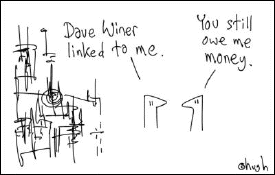
 Thanks for the excellent discussion that followed
Thanks for the excellent discussion that followed  On Saturday I wrote a
On Saturday I wrote a  Is it not one of the ones blessed by the critics and users?
Is it not one of the ones blessed by the critics and users?


 A few weeks ago I not only gave $100 to MoveOn.org, but I also encouraged readers of this blog to do so. Now I regret it. Why? Well, I gave them the money thinking I was supporting a group that was working to end the war in Iraq. Now they've launched a campaign against Facebook, a naive one, and in what way is that consistent with the goals of the organization I gave money to?
A few weeks ago I not only gave $100 to MoveOn.org, but I also encouraged readers of this blog to do so. Now I regret it. Why? Well, I gave them the money thinking I was supporting a group that was working to end the war in Iraq. Now they've launched a campaign against Facebook, a naive one, and in what way is that consistent with the goals of the organization I gave money to? 


 Commenting on yesterday's
Commenting on yesterday's  It's for little ideas that you want to share quickly. All you need is a cell phone.
It's for little ideas that you want to share quickly. All you need is a cell phone. 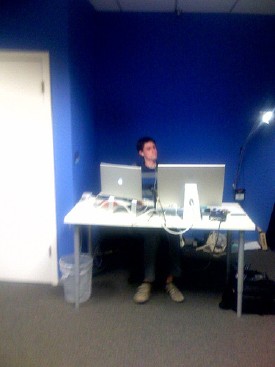
 Following up on
Following up on  I knew the day would come when users would wake up and realize that centralizing stuff is not good for the Internet. Today two signs that things are sorting themselves out.
I knew the day would come when users would wake up and realize that centralizing stuff is not good for the Internet. Today two signs that things are sorting themselves out.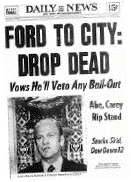 Don't kid yourself (and Wilson doesn't) the pubs that used to be blogs, Mike Arrington, Rafat Ali, Om Malik, etc are now pubs that compete with the other top entries on the TechMeme
Don't kid yourself (and Wilson doesn't) the pubs that used to be blogs, Mike Arrington, Rafat Ali, Om Malik, etc are now pubs that compete with the other top entries on the TechMeme  1. Locate the network drive you want to work with, starting in the SHARED sidebar section, clicking as needed to make it visible. Or alternatively, you can use the Connect to Server command in the Finder's Go menu. You can even mount servers over the Internet this way. (This part can be very slow, but you only have to do it once.) Here's a
1. Locate the network drive you want to work with, starting in the SHARED sidebar section, clicking as needed to make it visible. Or alternatively, you can use the Connect to Server command in the Finder's Go menu. You can even mount servers over the Internet this way. (This part can be very slow, but you only have to do it once.) Here's a 

 I rushed through this in my
I rushed through this in my 

 Yesterday at 6PM my home LAN went off the Internet. The DSL service was down, first time in a year, and in that year I had built a fair amount of stuff on the assumption that the connection is there. I couldn't update Scripting News, for example, because the CMS was running on an old laptop in the den.
Yesterday at 6PM my home LAN went off the Internet. The DSL service was down, first time in a year, and in that year I had built a fair amount of stuff on the assumption that the connection is there. I couldn't update Scripting News, for example, because the CMS was running on an old laptop in the den.  One of the biggest scores of BloggerCon I in October 2003 was connecting with Jay Rosen, journalism prof at NYU. He predicted almost everything we're doing today with blogging, long before there was a world-wide web. He understood that eventually publishing tools would become easier and cheaper, as would distribution, and that eventually the ability to write and publish news would become more commonplace. He used different words for what we do, but we understood what he was saying anyway. He taught us so much about the value of journalism, things we understood intuitively, he gave us words for.
One of the biggest scores of BloggerCon I in October 2003 was connecting with Jay Rosen, journalism prof at NYU. He predicted almost everything we're doing today with blogging, long before there was a world-wide web. He understood that eventually publishing tools would become easier and cheaper, as would distribution, and that eventually the ability to write and publish news would become more commonplace. He used different words for what we do, but we understood what he was saying anyway. He taught us so much about the value of journalism, things we understood intuitively, he gave us words for.





 I'm familiar with the thinking that one should fix problems in the code behind an API, that when you discover a bug it's just like a bug in normal software. The first time I made a change in Frontier that broke developers (including myself, btw) I understood why you have to live with the bugs once people have built on your API. To this day there are bugs in Frontier, lovingly preserved. If they were fixed, it would cause an unknown and therefore unacceptable amount of breakage.
I'm familiar with the thinking that one should fix problems in the code behind an API, that when you discover a bug it's just like a bug in normal software. The first time I made a change in Frontier that broke developers (including myself, btw) I understood why you have to live with the bugs once people have built on your API. To this day there are bugs in Frontier, lovingly preserved. If they were fixed, it would cause an unknown and therefore unacceptable amount of breakage. 
 I've heard that people have been
I've heard that people have been  My first essays were mostly about development platforms, the Internet, and how its open and easy protocols were routing around the messes created by alliances between the various tech leaders of the day. One of those pieces, Platform is Chinese Household, drew the analogy between platforms and ancient Chinese families. A successful platform, I theorized, was like a plural marriage. One husband, many wives. One platform vendor, many developers.
My first essays were mostly about development platforms, the Internet, and how its open and easy protocols were routing around the messes created by alliances between the various tech leaders of the day. One of those pieces, Platform is Chinese Household, drew the analogy between platforms and ancient Chinese families. A successful platform, I theorized, was like a plural marriage. One husband, many wives. One platform vendor, many developers. In 1994 I suggested that developer relations is a mating ritual, if so, giving flowers to 50,000 developers and leaving the rest of us to wonder why we don't get a chance, is not good love-making. Same with OpenSocial. Their campfires and marshmallows show that they understand that love is an important part of making a platform happen, but who was invited to their slumber party, and who wasn't? I think at this point in the evolution of their platform business, they would do better to if they were more open and inclusive -- save the parties for celebrating the birth of the babies, the products the developers create. Spread the seed far and wide, or don't spread it at all. I think that's the lesson of the Internet, of Apple and IBM, and General Magic and NeXT.
In 1994 I suggested that developer relations is a mating ritual, if so, giving flowers to 50,000 developers and leaving the rest of us to wonder why we don't get a chance, is not good love-making. Same with OpenSocial. Their campfires and marshmallows show that they understand that love is an important part of making a platform happen, but who was invited to their slumber party, and who wasn't? I think at this point in the evolution of their platform business, they would do better to if they were more open and inclusive -- save the parties for celebrating the birth of the babies, the products the developers create. Spread the seed far and wide, or don't spread it at all. I think that's the lesson of the Internet, of Apple and IBM, and General Magic and NeXT.


 I had lunch yesterday with Steve Gillmor. It had been too long. We talked about many things, including the fact that neither of us were going to many conferences this year. I think I've only been to three so far, maybe four. I've had the opportunity to go to dozens. But they're all the same, you spend the first half-day saying hello, then have a couple of good conversations, then you run out of things to do.
I had lunch yesterday with Steve Gillmor. It had been too long. We talked about many things, including the fact that neither of us were going to many conferences this year. I think I've only been to three so far, maybe four. I've had the opportunity to go to dozens. But they're all the same, you spend the first half-day saying hello, then have a couple of good conversations, then you run out of things to do. 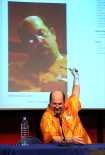

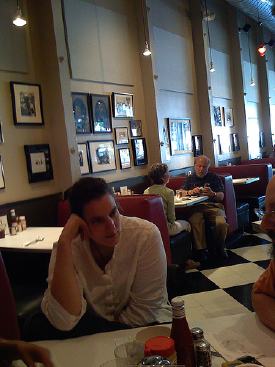
 Today's announcement from Facebook is the reason why Google announced OpenSocial last week. They must have gotten a leak from one of the companies that stood with Facebook, so they knew what was coming. They weren't scared of Facebook's technology, because they didn't respond with technology. They were scared because Facebook has a better advertising story than Google does. They are getting ready to offer some very premium web real estate that (pay attention now) Google can't compete with. And advertising is Google's bread and butter, advertising is to Google as operating systems are to Microsoft. They can't let somebody appear to be better than they are in advertising. Yet that's what Facebook is, better than Google in advertising.
Today's announcement from Facebook is the reason why Google announced OpenSocial last week. They must have gotten a leak from one of the companies that stood with Facebook, so they knew what was coming. They weren't scared of Facebook's technology, because they didn't respond with technology. They were scared because Facebook has a better advertising story than Google does. They are getting ready to offer some very premium web real estate that (pay attention now) Google can't compete with. And advertising is Google's bread and butter, advertising is to Google as operating systems are to Microsoft. They can't let somebody appear to be better than they are in advertising. Yet that's what Facebook is, better than Google in advertising.
 First a caveat. You don't have to agree with me, this is my opinion, and my blog, and that's what blogs are for, they're places where, if you happen to have an opinion, you can put it.
First a caveat. You don't have to agree with me, this is my opinion, and my blog, and that's what blogs are for, they're places where, if you happen to have an opinion, you can put it. You may think I am dishonest, you can even say so (but be careful to be sure you're right, and have the courage to put your name on it, only cowards make personal attacks anonymously) and do it in your space not mine. Here, I want comments with ideas and information. It's okay to disagree with me, the people who say that all they did was disagree are wrong. I never delete a comment just for being disagreeable. I delete them if they challenge my honesty. I really don't like that, I think the people who do it are creepy.
You may think I am dishonest, you can even say so (but be careful to be sure you're right, and have the courage to put your name on it, only cowards make personal attacks anonymously) and do it in your space not mine. Here, I want comments with ideas and information. It's okay to disagree with me, the people who say that all they did was disagree are wrong. I never delete a comment just for being disagreeable. I delete them if they challenge my honesty. I really don't like that, I think the people who do it are creepy. 

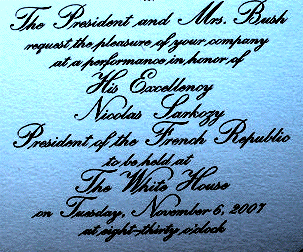
 Talking with a friend a few days ago, he asked what I thought of Leopard. He had installed the new version, like me, the first day it came out. "I'm not liking it," I said. He said something that was simple, profound and revealing: "It's like Windows." It is. It's that unpleasant to use. It disappears for long periods of time. Systems that didn't used to crash now crash regularly. On one system three hard disks were rendered unusable, and I lost a couple of full days restoring them (luckily I had good backups). The user interface is quirky. The new networking interface is a big step backward. The
Talking with a friend a few days ago, he asked what I thought of Leopard. He had installed the new version, like me, the first day it came out. "I'm not liking it," I said. He said something that was simple, profound and revealing: "It's like Windows." It is. It's that unpleasant to use. It disappears for long periods of time. Systems that didn't used to crash now crash regularly. On one system three hard disks were rendered unusable, and I lost a couple of full days restoring them (luckily I had good backups). The user interface is quirky. The new networking interface is a big step backward. The 

 Well, of course I don't know, they aren't communicating with riffraff like me, but I have some experience with this kind of stuff, so I can hazard a guess. If they publish a spec,all kinds of projects will likely get started to enable the API in (just for the sake of argument): Drupal, WordPress, Twitter, Pownce, Jaiku, Scripting News (why not add widgets to a random blog), CNN, The New York Times, well you get the idea. There might be lots of implementations very quickly. And that would be it for changes. It would be frozen de facto, they'd have to live with what they have, which given how quickly it was thrown together, probably isn't very good. Not the kind of stuff you'd like to support for the next decade or two.
Well, of course I don't know, they aren't communicating with riffraff like me, but I have some experience with this kind of stuff, so I can hazard a guess. If they publish a spec,all kinds of projects will likely get started to enable the API in (just for the sake of argument): Drupal, WordPress, Twitter, Pownce, Jaiku, Scripting News (why not add widgets to a random blog), CNN, The New York Times, well you get the idea. There might be lots of implementations very quickly. And that would be it for changes. It would be frozen de facto, they'd have to live with what they have, which given how quickly it was thrown together, probably isn't very good. Not the kind of stuff you'd like to support for the next decade or two.
 I had a lunch in SF, so I missed the rush of news today.
I had a lunch in SF, so I missed the rush of news today.


